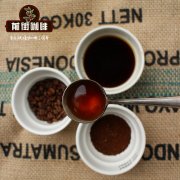What are the kinds of Arabica beans? what kind of coffee beans is iron pickup?

Professional coffee knowledge exchange more coffee bean information please follow the coffee workshop (Wechat official account cafe_style)
Introduction to the varieties of Qianjie-tin card
Typica is the most famous variety in Arabica. It is a variety with high quality and low yield, but is very sensitive to diseases and insect pests.
Like other Arabica coffee, Typica originated in southwestern Ethiopia. Sometime in the 15th-16th century, it was brought to Yemen by Ethiopian troops. By the 16th century, Yemeni coffee seeds had spread to India. According to historical records, in 1696 and 1699, the coast of Malabar, India, transported two batches of coffee seeds to Badawiya (present-day Java, Indonesia). These seeds are what we now call Typica. In 1706, a Typica coffee sapling moved from Java to Amsterdam in the Netherlands and settled in the botanical garden. Later, in 1714, the Netherlands distributed some more seeds to France.
Typica was sent from the Netherlands by colonial trade route in 1719 to Dutch Guiana (now Suriname), then to Cayenne (French Guiana) in 1722, where it spread to northern Brazil in 1727, and to southern Brazil between 1760 and 1770. In 1723, the French sent Typica from Paris to Martinique in the West Indies, and then the British introduced Typica coffee from Martinique to Jamaica and to Santo Domingo in 1730. In 1735, the seeds of Typica were sent to Cuba from Santo Domingo. Later, Costa Rica (1779) and El Salvador (1840) obtained seeds from Cuba, respectively.
In the late 18th century, Typica varieties spread to the Caribbean (Cuba, Puerto Rico, Santo Domingo), Mexico and Colombia, and from there across Central America. Until the 1940s, most coffee plantations in South and Central America grew Typica. Because of its low yield and sensitivity to major coffee pests, Typica has been gradually replaced by other varieties in most parts of the Americas, but it is still widely cultivated in Peru, Dominica and Jamaica. Jamaica Blue Mountain, which we are most familiar with, belongs to the Typica variety.
Characteristics of Iron pickup Coffee beans
The iron pickup is characterized by tall coffee trees, bronzed leaves at the top, large and long coffee beans, pointed at both ends, a bit like an egg. Iron pickup coffee beans often have citrus sour taste, with a sweet aftertaste, is praised by many people as elegant and clear coffee beans, but unfortunately the iron pickup is very high, and the disease resistance is very poor, it is difficult to resist leaf rust, fruit pulp disease, Coffee berry disease, nematode disease and other most common diseases and insect pests, the yield is very rare.
If the iron pickup is grown within 5 degrees of north and south latitude, it is recommended that the alpine flavor of more than 1600 meters is the best; if it is in the range of 5-15 degrees of north and south latitude, it is better to plant more than 1300 meters; and if the latitude is more than 15 degrees, it is also recommended to plant at least 1000 meters.
Knowledge: Robusta is planted below 800 meters above sea level. Robusta has strong adaptability and strong resistance to diseases and insect pests.
In short: Qianjie is a coffee research hall, happy to share the knowledge about coffee with you, we share unreservedly just to make more friends fall in love with coffee, and there will be three low-discount coffee activities every month. The reason is that Qianjie wants to make more friends drink the best coffee at the lowest price, which has been Qianjie's tenet for 6 years!
END
Important Notice :
前街咖啡 FrontStreet Coffee has moved to new addredd:
FrontStreet Coffee Address: 315,Donghua East Road,GuangZhou
Tel:020 38364473
- Prev

What kind of coffee beans have the best flavor? Arabica beans have the characteristics of weak scholars with outstanding ability.
Professional coffee knowledge exchange more coffee bean information please follow the coffee workshop (Wechat official account cafe_style) front street-Arabica variety introduction according to biology, we are divided into Arabica (Arabica), Robusta (Robusta) and Liberica (Arabica). The output of Libby card is very small, and it is hardly used for commercial use, so let's not introduce it for a while.
- Next

Indonesian iron pickup flavor will be more wild Sumatra iron pickup has its own unique charm
Professional coffee knowledge exchange More coffee bean information Please pay attention to coffee workshop (Weixin Official Accounts cafe_style) Qianjie-Sumatra iron pickup variety introduction Like drinking red wine, coffee is also divided into many varieties, there are only two kinds that really have commercial value and are planted in large quantities, and the quality of coffee beans produced is also superior to coffee beans produced by other coffee trees. Coffee varieties to biological
Related
- Beginners will see the "Coffee pull flower" guide!
- What is the difference between ice blog purified milk and ordinary milk coffee?
- Why is the Philippines the largest producer of crops in Liberia?
- For coffee extraction, should the fine powder be retained?
- How does extracted espresso fill pressed powder? How much strength does it take to press the powder?
- How to make jasmine cold extract coffee? Is the jasmine + latte good?
- Will this little toy really make the coffee taste better? How does Lily Drip affect coffee extraction?
- Will the action of slapping the filter cup also affect coffee extraction?
- What's the difference between powder-to-water ratio and powder-to-liquid ratio?
- What is the Ethiopian local species? What does it have to do with Heirloom native species?

